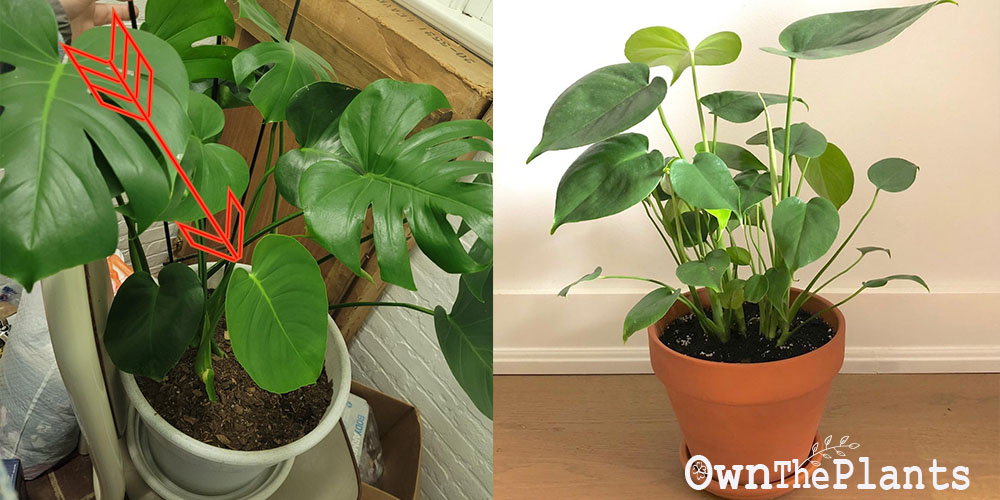If you are already a proud owner of a Monstera plant or two, then you know exactly how stunning this plant is.
With its huge, verdant, heart-shaped foliage that are pierced with distinct holes and splits, it surely is an eye-catcher and a great conversation piece.
The beauty of this commonly called Swiss Cheese plant lies heavily on its leaf holes that are sort of bizarre and peculiar, but dazzling.
However, there are indeed situations when these leaves become bland and lacking of their sought-after holes.
But worry no more! In this article, we’ll be taking you on another informative route where you understand more about why your Monsteras have holes and why they sometimes do not naturally split.
We will also give you tips on how you can encourage your plant to grow more splits and be more alive and kicking!
What are you waiting for? Let’s dive right in.
Why Do Monsteras Have Holes In The Leaves?
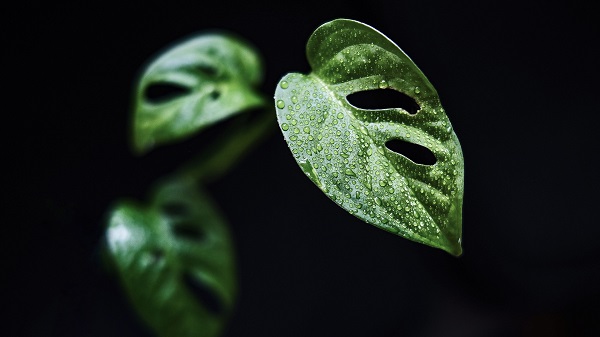
The holes in the leaves of Monsteras are the key aesthetic character that plant enthusiasts sought after.
The quirk and the peculiar feel brought by the perforated leaves of Monstera plant surely adds to its visual signature look.
However, the holes, or the more correct botanical term “fenestrations”, are there serving for a practical function, and not just purely aesthetic. Botanists have varying theories around it but we’ll delve into some.
The general theory about the holes is that they have resulted from natural evolution.
As your Swiss Cheese plant hails from tropical rainforests where intense hurricanes are frequent, the holes made these plants tolerant to strong, vivacious winds. The holes are their natural defense mechanism.
Another perspective is that the holes allow more efficient sunlight acquisition.
The holes allow the light beams to reach the lowest part of the plant. It is a logical theory since Monsteras grow in crowded forests and the competition for light is quite a struggle.
The search is still ongoing for the real reason of why Monsteras have these unique fenestrations.
But no matter the reason is, it cannot dissolve the fact that the holes are important for your plant. Not having these holes is surely a problematic sign that needs to be rightfully addressed.
Why Does My Monstera Have No Holes In The Leaves?
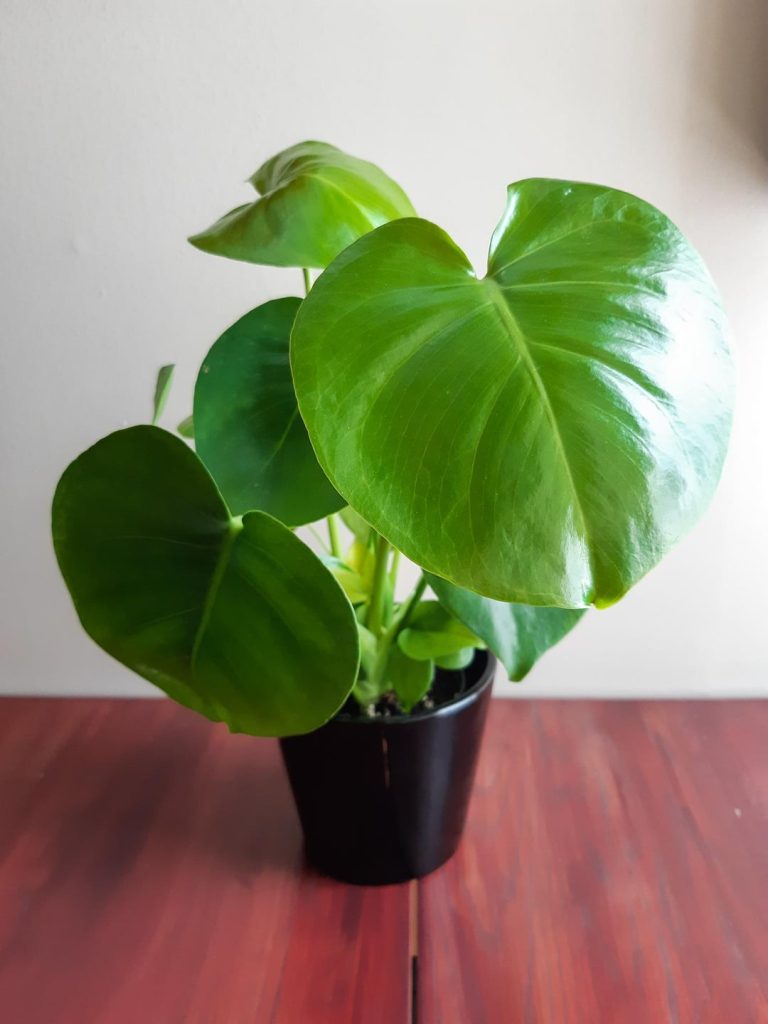
Again, as mentioned before, a Swiss Cheese Plant that does not live up to its name, is a troubling sign.
There are several factors that may contribute to the lack of development of fenestrations and causing your plant to look bland.
We will go through these factors one by one to help you find the root cause of your problem.
Age Problem
The Monsteras have a unique life cycle in a way that the juvenile stage does not look like its mature stage.
The juvenile leaf of Swiss Cheese plant does not have fenestrations or leaf splits yet. Maturity is essential for your plant to grow fenestrated leaves.
If your Monstera Deliciosa plant is only a few months old, then you should not expect any distinct fenestrations to come out just yet.
A young Monstera plant will only have full, entire, green leaves. It will only grow fenestrations, key holes, and leaf splits when it reaches age 2 to 3.
Light Conditions
As a tropical plant, Monsteras thrive best in bright, indirect sunlight. It is important that your plant gets the optimum light conditions for it, since insufficient light can really hamper its development.
Without sunlight or any light source, plants could not make their own food through the process of photosynthesis. Insufficient light would definitely mean that your plant will not have enough energy to grow.
If your plant does not have enough energy to grow, then it is more likely that it will not split.
When there is scarcity of light and energy, your plant will direct the limited, available energy to produce more branches, leaves, and stems to survive rather than grow holes in the leaves.
Watering Issue
Water, just like light, is essential for plants to live. Without water, the light could not be transformed to an energy resource.
Hence, lack of water will also inhibit the development of your Monstera deliciosa.
Whether in a pot or in an outdoor garden, it is very important that you correctly water your plant. Water helps in nutrient acquisition from the soil. These nutrients and minerals will help your plant grow healthily and at a much faster rate.
Water also helps in transporting plant food. Without enough water, these plant resources could not be transported from the roots to the leaves.
As a consequence, your plant will not have sufficient energy to split and develop holes as required.
Hence, if you have a problem with your Monstera plant not having holes, it might help if you check your watering routine.
Fertilizer
Plant fertilizers are occasionally necessary since plants sometimes need extra boost to grow. This is true especially that nutrients in the soil get less and less every after watering.
The minerals and nutrients in a fertilizer include Phosphorus, Potassium, and Nitrogen, which help in developing stronger and more vigorous plants.
If your plant is in a scarce environment, it is most likely to fail to flourish on its own.
So, it is important that you add fertilizers to keep it healthy and flourishing. Lack of nutrients in the soil leads to low growth of your Swiss Cheese plant.
You might like: Why Does My Monstera Have Brown Spots? (6 Causes + Fix)
How To Get Your Monstera To Develop Leaf Holes
The lack of leaf holes can be unmotivational but it is not the end of your Monstera plant owner journey.
You can still do something about your plant so that it will grow well and produce the sought-after holes.
Now that you understand the reasons behind the lack of leaf holes, you can now adjust your plant care routine appropriately.
Here are some of the tips you should consider to help your Monstera deliciosa grow the way it should be:
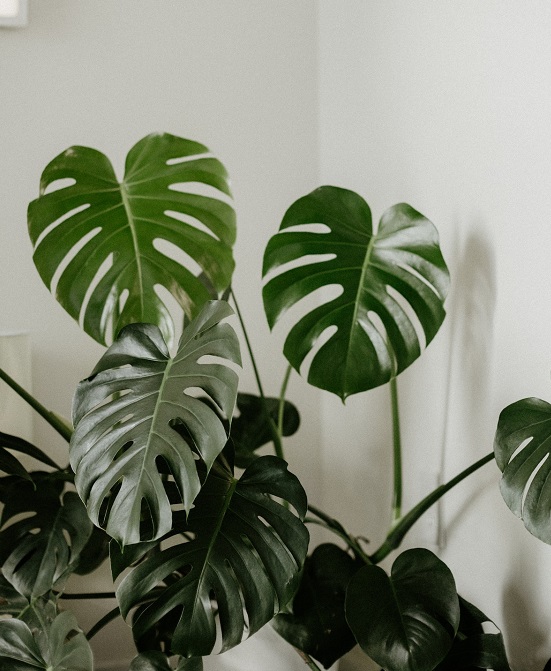
Adjust the lighting conditions
Improper lighting conditions is the main cause of Monstera leaves not having holes.
If you suspect this is also the cause of your plant, adjust its placement so it could get the bright, indirect sunlight it needs.
A filtered bright light means that light should not directly hit your plant and bounce off from another surface.
This will avoid burning your plant leaves. The best place indoors is near east-facing windows.
Maintain a Watering Routine
Lack of water is also a detrimental cause of bland Monstera leaves. Irregular watering and lack of watering routine may be the main reason behind this. Rectify your watering schedule at once to solve this problem.
Select 2 days in a week to water your plant and maintain this schedule. It would be best for your plant to get water in the morning, as it will also receive the optimum benefits from sunlight and run the risk of having waterlogged soil.
If it helps to keep you on schedule, use a calendar or put a reminder on your phone. Mark your watering days to keep you on track.
However, there are certain occasions that maintaining a strict watering routine can be more harmful than beneficial.
As a general rule, check your plant soil first before watering and assess the moisture level.
If the soil is dry already, then proceed with watering. However, if it is still moist, then it would be best to skip the watering until the next day or so.
Feed Your Plant With Balanced Fertilizer
Especially if your plant has been growing in low-nutrient soil for a long period of time, it would help your plant to develop leaf holes when they are fed with balanced fertilizer.
Replenishing lost nutrients in the soil regularly is a good maintenance routine that will save your plant from future plant problems.
A fertilizer that has a 20-20-20 ratio (N-P-K) is best for your plant. You can dilute this to half of its concentration to avoid chemical burns.
Pour a generous amount of this diluted fertilizer to the soil surface once or twice a month for best results.
Prune Your Monstera Plant to Encourage New Growth
As we all know, pruning Monstera plants encourages new and healthy growth. If you are resetting your Monstera plant to develop leaf holes, pruning might be a good step to do.
The best time to prune your plant is during spring when it is actively growing and experiencing spurts of growth.
Will My Monstera Leaf Develop Holes Later On?
Unfortunately, once your Monstera leaf has matured and does not develop holes, it will not develop any later on even though you have adjusted your care routine. Leaf hole development is irreversible.
But do not be disheartened. Just continue on giving the best care for your Monstera plant and for sure, the next set of leaves or so will have the fenestrations and leaf splits they should rightly have.
You might like: What Should I Do With My Root Bound Monstera? (Answers + Fix)
Why Are My Monstera Leaves Small?
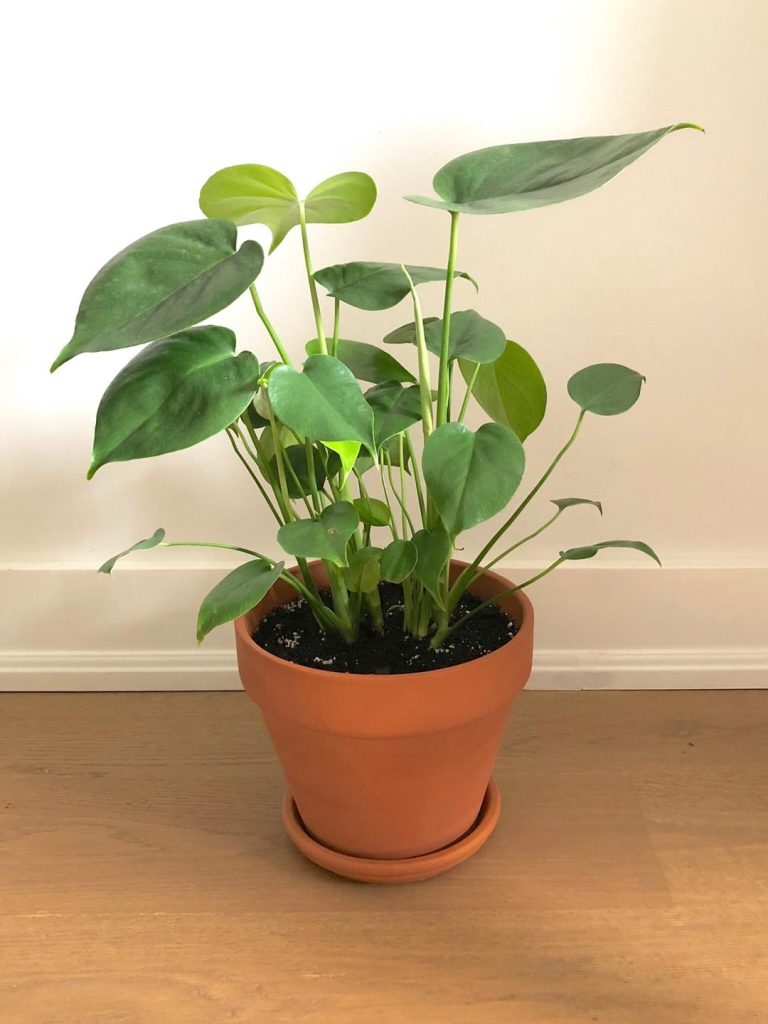
In a different but completely related note, the size of your Monstera leaves also greatly depend on the environmental conditions your plant is in.
Just like the loss of leaf holes, smaller Monstera leaf size is also a problem of its growth and development caused by improper lighting conditions, watering, nutrient deficiency, and even level of maturity.
If you find this problem along with missing leaf holes, just continue adjusting your routine to a more appropriate, specific one for your Monstera plant.
The key to a healthier and livelier plant is always meeting its optimum requirements.
Final Thoughts
Your Monstera deliciosa plant, or commonly known as Swiss Cheese plant, is an easy to care, low maintenance houseplant that is very convenient to grow.
With its unique stylish leaves, it can easily become one of the focal points in your garden or indoor spaces. That is why so many people cherish it!
As a plant owner, just remember that the beauty of your plant solely relies on the care it is given.
When you nurture it well and give it the best care they need, for sure, your plant will bestow upon you its marvel and natural magic. Give them love and they will love you in return.
If you have something to share about your Monstera experiences, then feel free to comment them down in the comment section below. The whole world is excited to hear from you!
